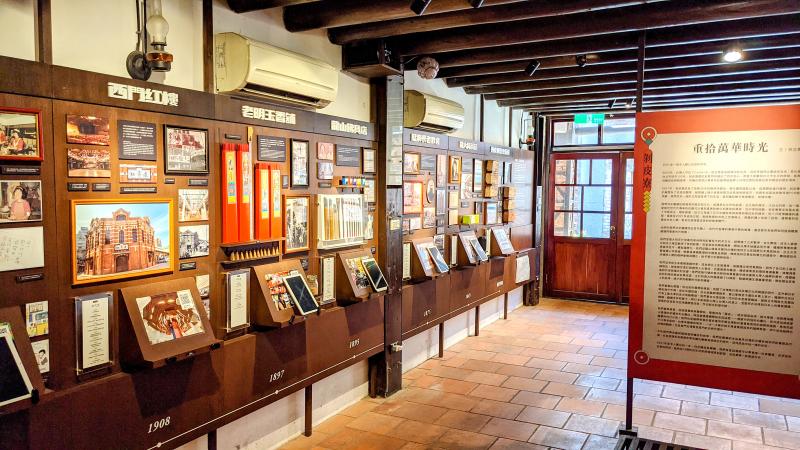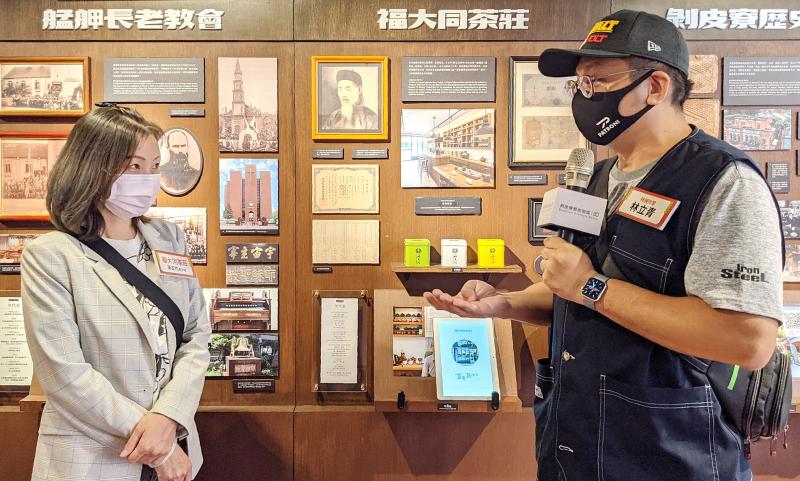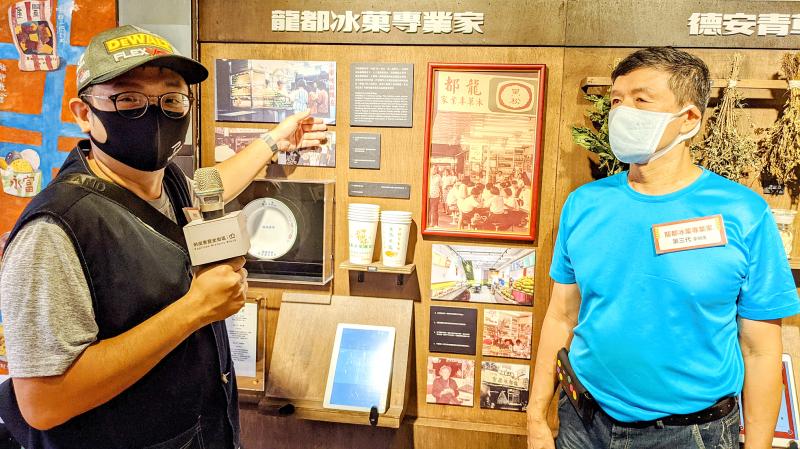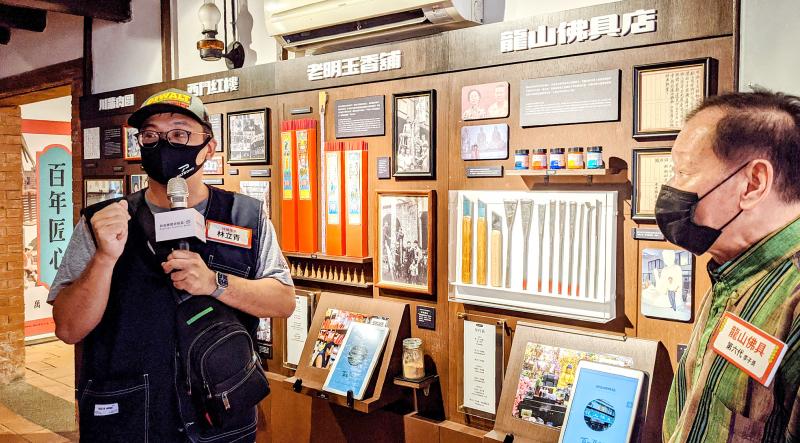Longdu Ice Dessert Parlor (龍都冰果專業家) is no stranger to weathering outbreaks.
Nearly 60 years before COVID-19 forced the Wanhua District (萬華) store to shut down in May, it was banned from selling frozen treats during Taipei’s last major cholera epidemic in 1962.
The shop turned to serving soda to survive, devising a way to beat the competition by pouring drinks over large chunks of ice — which made the fizz and flavor last longer. This was just one of the myriad adjustments the shop has gone through since current owner Lee Ming-tan’s (李明潭) grandfather started selling iced sweet rice noodles in the street in 1920 from a shoulder pole.

Photo: Han Cheung, Taipei TImes
Lee’s grandfather was arrested and beaten by the Japanese police for buying black market sugar, but he persisted after the ordeal, which cemented his brand’s local reputation.
Longdu is one of 13 century-old Wanhua businesses featured in Bopiliao Historic Block’s A Century of Craftsmanship — The Wanhua Story (百年匠心:重拾萬華時光) exhibit, which opened yesterday after people were finally allowed to dine in without partitions on Tuesday. The mood was celebratory and speakers became emotional when discussing the outbreak, which hit Wanhua the hardest and saw the historic site turn into a rapid-testing station for over a month.
“[The outbreak] was like a battle, and now we’re trying to return to our everyday lives,” Bopiliao Historic Block director Yeh Yi-ching (葉益青) says. “Through this exhibition, I hope people can begin returning to the historic block.”

Photo: Han Cheung, Taipei TImes
Many local guests spoke of the tenacity of Wanhua’s people, not just surviving this latest challenge but keeping their shops alive for a century. Several owners were in attendance, and the host made sure to introduce which generation they belonged to — Fulldone Old Tea (福大同) and Longshan Buddha Shop (龍山佛具), for instance, are both on their sixth generation.
The exhibition is a continuation or upgrade of last year’s show featuring 10 businesses, with Longdu being one of three new additions to the roster.
“This exhibit is alive and ongoing; each year we will continue to find new shops and tell their stories,” Yeh says.

Photo: Han Cheung, Taipei TImes
Author Lin Li-ching (林立青) led a tour of the exhibition during the opening, focusing on the adjustments each generation of owners made to their shops over the years. Lin was tasked with interviewing the shop owners and writing the exhibition’s text (unfortunately only the main parts are translated into English).
“We can see how these shops have dealt with regime changes, disease outbreaks, war, urban planning and all sorts of other factors that have affected local life,” Lin says. “This needs to be done now as different generations tend to remember different things. Some have forgotten a lot, and some need to be shown old photos to jog their memory on what sort of different tools they used in the past.”
Policy changes also play a big part — restaurants went from using porcelain bowls to disposable ones over the decades, but had to adjust again due to recent environmental concerns. Medicinal herb shops started out taking on more of a physician role, but after the government implemented regulations for medical practitioners, they switched their focus to providing healthy herbal brews.

Photo: Han Cheung, Taipei TImes
Interestingly, marriage also played a part in a store’s evolution as the owner’s wife often brought her family’s expertise to the shop. Long Cheng Hao (龍城號) noodle shop added its current menu of various slow-cooked soups this way.
Keeping relevant is also key, as younger owners focus on modernizing while maintaining and refining the family craft.
“Looking on the bright side, the outbreak allowed us time to search for new directions and further hone our skills,” squid soup shop Liang Xi Hao’s (兩喜號) fourth-generation owner Chen Yu-an (陳輿安) says. “There’s a reason we all have been able to survive for 100 years. I hope that over the next 100 years, we business owners can continue to innovate while passing on traditions.”

Dissident artist Ai Weiwei’s (艾未未) famous return to the People’s Republic of China (PRC) has been overshadowed by the astonishing news of the latest arrests of senior military figures for “corruption,” but it is an interesting piece of news in its own right, though more for what Ai does not understand than for what he does. Ai simply lacks the reflective understanding that the loneliness and isolation he imagines are “European” are simply the joys of life as an expat. That goes both ways: “I love Taiwan!” say many still wet-behind-the-ears expats here, not realizing what they love is being an

Google unveiled an artificial intelligence tool Wednesday that its scientists said would help unravel the mysteries of the human genome — and could one day lead to new treatments for diseases. The deep learning model AlphaGenome was hailed by outside researchers as a “breakthrough” that would let scientists study and even simulate the roots of difficult-to-treat genetic diseases. While the first complete map of the human genome in 2003 “gave us the book of life, reading it remained a challenge,” Pushmeet Kohli, vice president of research at Google DeepMind, told journalists. “We have the text,” he said, which is a sequence of

Every now and then, even hardcore hikers like to sleep in, leave the heavy gear at home and just enjoy a relaxed half-day stroll in the mountains: no cold, no steep uphills, no pressure to walk a certain distance in a day. In the winter, the mild climate and lower elevations of the forests in Taiwan’s far south offer a number of easy escapes like this. A prime example is the river above Mudan Reservoir (牡丹水庫): with shallow water, gentle current, abundant wildlife and a complete lack of tourists, this walk is accessible to nearly everyone but still feels quite remote.

It’s a bold filmmaking choice to have a countdown clock on the screen for most of your movie. In the best-case scenario for a movie like Mercy, in which a Los Angeles detective has to prove his innocence to an artificial intelligence judge within said time limit, it heightens the tension. Who hasn’t gotten sweaty palms in, say, a Mission: Impossible movie when the bomb is ticking down and Tom Cruise still hasn’t cleared the building? Why not just extend it for the duration? Perhaps in a better movie it might have worked. Sadly in Mercy, it’s an ever-present reminder of just